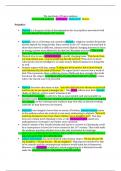The merchant of Venice analyses
Context and audience. techniques. Characters. Quotes
Prejudice
Shylock is a frequent victim of discrimination due to prejudices associated with
Jews like himself during the 16th century.
Antonio, who is a Christian and considers Shylock a religious outsider frequently
abuses shylock for being Jewish. Since society in the 16 th century was less kind to
those they viewed as different, Antonio views Shylock charging interest for loans
as wrong, as Jews were allowed to do this but Christians were not. This is why
Jews were allowed in Venice, as they helped boost the economy.
Shylock tries to use a biblical allusion to justify charging loans, “This Jacob from
our holy Abram was… as you would say directly interest. “This story is about
when Jacob uses his intelligence to make money, Shylock thinks he is doing this
as well.
Antonio argues with him, saying “A thing not in his power, but a hand swayed
and fashioned by the hand of Heaven.” He argues Jacob’s success was a work of
God. This represents their conflicting views of faith and how strongly they both
feel about the subject, as religion was very important in the 16th century, a time
where the church was very powerful.
Shylock describes this abuse to him: “you who did void your rheum on my beard
and foot me as you spurn a stranger cur.” This simile reflects how little Antonio
thinks of Shylock, as if he wasn’t a human at all.
The modern audience would view this as unacceptable and unreasonable on
Antonio’s part, however anti- sematic behaviours were more common during the
16th century. So the contemporary audience may view this as Antonio treating
someone as they deserve to be treated.
Shylock’s own daughter leaves him to marry a Christian, Lorenzo. Jessica states
to the audience when she is about to run away, unknowing to shylock: “farewell;
and if my fortune be not crost, I have a father, you a daughter lost”. The play
does not contain much rhyming verses, so the rhyming couplet stands out,
making Jessica’s betrayal to her father more dramatic.
Jessica’s shame of her Jewish identity and desire to convert to Christianity could
be a consequence to how Jew’s were treated in the 16th century. This could make
the audience question whether love is the only motivation for marriage.
Jews were not allowed to be citizens. They couldn’t own land and had to live in a
separate part of the city called Ghettos.
Salanio and Solerio also mock Shylock when Jessica elopes. “Oh my Ducats! Oh
my daughter… Oh my ducats… Oh my daughter.” Shakespeare intended for this
to be comedic and the contemporary audience would think this is humorous.
However, the repetition of shylock’s words suggesting he is distressed would
make the modern audience sympathise with him instead.
, Shylock’s outburst when others mock him when his daughter, Jessica elopes with
a Christian man, highlights how unnecessarily cruel all the discrimination he had
to endure at the hands of Christians. He says “He hath disgraced me… and what’s
his reason? I am a Jew….” The hyperphoria would make even the contemporary
audience question their views.
He goes onto stating “if you prick us do we not bleed? If you tickle us do we not
laugh?” This grammatical parallelism points out how Jews are as human as
Christians, and that they have more in common than what separates them.
The hyperphoria of “If a Christian wrong a Jew, what should his sufferance be by
Christian example? Why, revenge!” This explains how revenge isn’t only a Jewish
example but a Christian one too, as the Bible states “an eye for an eye.”
Therefore, it is not fair for him to be villainised so much.
Other characters also villainise Shylock despite treating him awfully. Antonio
states he is “To suffer with quietness of spirit, the very tyranny and rage of his”
during the court room scene, where Shylock plans to cut the flesh around his
heart for revenge. This is ironic because Antonio himself had inflicted so much
pain on Shylock previously, making Shlock a victim too. In the contemporary
audiences’ eyes Antonio is an innocent Christian suffering at the hands of a
vindictive, unreasonable Jew. However, the modern audience would view this
differently.
Antonio shows mercy in the contemporary audiences’ view when he requests
Shylock “presently becomes a Christian”, when Shylock chooses not to carry out
his revenge due to the loophole of not being able to spill Christian blood. This
would have been seen as beneficial for Shylock as they would view Antonio as
saving his soul. However, this it the ultimate punishment for shylock who’s
Jewish identity is very important to him.
Portia mocks her suitors, for example she makes fun of a particular prince,
saying “ay that’s a colt indeed…. talk of his horse”. The Pun of the colt being a
young male horse suggests he is young and inexperienced. This shows she judges
her suitors comedically, but rather harshly despite not knowing them well.
However, when she is talking about the Prince of Morocco, she says “if he had the
condition of a saint and the complexion of a Devil, I had rather him shrive me
than wive me”. The juxtaposition of saint and devil shows her prejudical beliefs.
Her beliefs reflect common attitudes to race in the 16th century.




